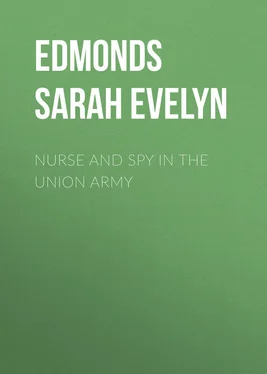Sarah Edmonds - Nurse and Spy in the Union Army
Здесь есть возможность читать онлайн «Sarah Edmonds - Nurse and Spy in the Union Army» — ознакомительный отрывок электронной книги совершенно бесплатно, а после прочтения отрывка купить полную версию. В некоторых случаях можно слушать аудио, скачать через торрент в формате fb2 и присутствует краткое содержание. Жанр: История, История, foreign_antique, foreign_prose, на английском языке. Описание произведения, (предисловие) а так же отзывы посетителей доступны на портале библиотеки ЛибКат.
- Название:Nurse and Spy in the Union Army
- Автор:
- Жанр:
- Год:неизвестен
- ISBN:нет данных
- Рейтинг книги:4 / 5. Голосов: 1
-
Избранное:Добавить в избранное
- Отзывы:
-
Ваша оценка:
- 80
- 1
- 2
- 3
- 4
- 5
Nurse and Spy in the Union Army: краткое содержание, описание и аннотация
Предлагаем к чтению аннотацию, описание, краткое содержание или предисловие (зависит от того, что написал сам автор книги «Nurse and Spy in the Union Army»). Если вы не нашли необходимую информацию о книге — напишите в комментариях, мы постараемся отыскать её.
Nurse and Spy in the Union Army — читать онлайн ознакомительный отрывок
Ниже представлен текст книги, разбитый по страницам. Система сохранения места последней прочитанной страницы, позволяет с удобством читать онлайн бесплатно книгу «Nurse and Spy in the Union Army», без необходимости каждый раз заново искать на чём Вы остановились. Поставьте закладку, и сможете в любой момент перейти на страницу, на которой закончили чтение.
Интервал:
Закладка:
“Oh, what an amount of suffering I am called to witness every hour and every moment. There is no cessation, and yet it is strange that the sight of all this suffering and death does not affect me more. I am simply eyes, ears, hands and feet. It does seem as if there is a sort of stoicism granted for such occasions. There are great, strong men dying all around me, and while I write there are three being carried past the window to the dead room. This is an excellent hospital – everything is kept in good order, and the medical officers are skillful, kind and attentive.”
The weary weeks went slowly by, while disease and death preyed upon the men, and the “Soldiers’ Cemetery” was being quickly filled with new made graves. The kindness of the soldiers toward each other is proverbial, and is manifested in various ways. It is a common thing to see soldiers stand guard night after night for sick comrades – and when off duty try, to the utmost of their skill, to prepare their food in such a way as to tempt the appetite of those poor fellows whom the surgeons “do not consider sufficiently ill to excuse from duty;” but their comrades do, and do not hesitate to perform their duty and their own also. And when brought to camp hospital, helpless, worn down by disease, and fever preying upon their vitals – those brave and faithful comrades do not forsake them, but come several times every day to inquire how they are, and if there is anything they can do for them. And it is touching to see those men, with faces bronzed and stern, tenderly bending over the dying, while the tears course down their sunburnt cheeks.
There is scarcely a soldier’s grave where there is not to be seen some marks of this noble characteristic of the soldier – the tastefully cut sod, the planted evergreen, the carefully carved head-board, all tell of the affectionate remembrance of the loved comrade. You will scarcely find such strong and enduring friendship – such a spirit of self-sacrifice, and such noble and grateful hearts, as among the soldiers. I think this is one reason why the nurses do not feel the fatigue of hospital duty more than they do; the gratitude of the men seems to act as a stimulant, and the patient, uncomplaining faces of those suffering men almost invariably greet you with a smile. I used to think that it was a disgrace for any one, under ordinary circumstances, to be heard complaining, when those mutilated, pain-racked ones bore everything with such heroic fortitude.
I was not in the habit of going among the patients with a long, doleful face, nor intimating by word or look that their case was a hopeless one, unless a man was actually dying, and I felt it to be my duty to tell him so. Cheerfulness was my motto, and a wonderful effect it had sometimes on the despondent, gloomy feelings of discouraged and homesick sufferers. I noticed that whenever I failed to arouse a man from such a state of feeling, it generally proved a hopeless case. They were very likely not to recover if they made up their minds that they must die, and persisted in believing that there was no alternative.
There were a great many pleasant things in connection with our camp hospital duties. I really enjoyed gratifying some of the whims and strange fancies of our poor convalescent boys, with whom I had become quite a favorite. As I would pass along through the hospital in the morning, I would generally have plenty of assistants in helping to make out my programme for the day. For one I had to write letters, read some particular book to another, and for a third I must catch some fish. I remember on one occasion of an old Dutchman, a typhoid convalescent, declaring that he could eat nothing until he could get some fresh fish, and of course I must procure them for him. “But,” said I, “the doctor must be consulted; perhaps he will not think it best for you to have any fish yet, until you are stronger.” “Vell, I dusn’t care for te toctor – he dusn’t know vat mine appetite ish – te feesh I must have. Oh, mine Cot! I must have some feesh.” And the old man wept like a child at the thought of being disappointed. “Hunter’s Creek” was about a mile and a half from camp, where Mr. and Mrs. B. and I had spent many an hour fishing and shooting at the flocks of wild ducks which frequented it; so, after providing myself with hook, line and bait, I made my way to the creek. Soon after I commenced operations I drew up a monstrous eel, which defied all my efforts to release the hook from its jaws. At last I was obliged to draw it into camp by means of the line – and I was amply repaid for my trouble on seeing the delight of the convalescents, and especially of my old Dutchman, who continued to slap his hands together and say – “Dhat ish coot – dhat ish coot.” The eel was handed over to the cook to be prepared for dinner, and to the great satisfaction of the Dutchman he was permitted to enjoy a portion of it.
The army under McClellan began to assume a warlike aspect – perfect order and military discipline were observed everywhere among the soldiers. It was a splendid sight to see those well drilled troops on dress-parade – or being reviewed by their gallant young commander, upon whose shoulders the “stars” sat with so much grace and dignity.
The monotony of camp life began to be broken up by armed reconnoissances and skirmishing between the pickets. Our lines were pushed forward to Lewinsville on the right, and to Munson’s Hill in front. The pickets of both armies were posted in plain sight of each other, only separated by the beautiful corn-fields and peach-orchards. Picket firing was kept up all along the lines on both sides, notwithstanding that flags of truce had been sent in by both parties, several times, requesting that this barbarous practice might cease.
As soon as Mrs. B. was so far recovered as to be able to ride, we started one day, accompanied by Mr. B. and Dr. E., for Munson’s Hill, to see the pickets on duty. We rode along until we came within a short distance of the rifle pits where our men were, when the rebels fired upon us. We turned and rode back until we came to a clump of trees, where we dismounted, hitched our horses, and proceeded the rest of the way on foot – part of the way having to crouch along on our hands and knees, in order to escape the bullets which were whistling above us. We reached the rifle pits in safety, which were close to a rail fence, the rails of which were perfectly riddled with Minnie balls. While we sat there looking through an opera-glass, whiz! came a ball and struck the rail against which my head rested; glancing, it passed through Dr. E.’s cap and lodged in the shoulder of one of the men. We remained there until the firing ceased, then returned to camp, carrying with us the wounded man.
Picket duty is one of the most perilous and trying duties connected with the service. A clergyman-soldier writing upon this subject, briefly describes it: “Picket duty at all times is arbitrary, but at night it is trebly so. No monarch on a throne, with absolute power, is more independent, or exercises greater sway for the time being, than a private soldier stationed on his beat with an enemy in front. Darkness veils all distinctions. He is not obliged to know his own officers or comrades, or the commanding general, only through the means of the countersign. With musket loaded and capped he walks his rounds, having to do with matters only of life and death, and at the same time clothed with absolute power. It is a position of fearful importance and responsibility, one that makes a man feel solemn and terribly in earnest. Often, too, these posts are in thick woods, where the soldier stands alone, cut off from camp, cut off from his fellows, subject only to the harrassings of his own imagination and sense of danger. The shadows deepen into inky night; all objects around him, even the little birds that were his companions during the day, are gathered within the curtains of a hushed repose; but the soldier, with every nerve and faculty of his mind strained to the utmost tension of keenness and sensibility, speaks only in whispers; his fingers tighten round the stock of his musket as he leans forward to catch the sound of approaching footsteps, or, in absence of danger, looks longingly up to the cold, grey sky, with its wealth of shining stars.”
Читать дальшеИнтервал:
Закладка:
Похожие книги на «Nurse and Spy in the Union Army»
Представляем Вашему вниманию похожие книги на «Nurse and Spy in the Union Army» списком для выбора. Мы отобрали схожую по названию и смыслу литературу в надежде предоставить читателям больше вариантов отыскать новые, интересные, ещё непрочитанные произведения.
Обсуждение, отзывы о книге «Nurse and Spy in the Union Army» и просто собственные мнения читателей. Оставьте ваши комментарии, напишите, что Вы думаете о произведении, его смысле или главных героях. Укажите что конкретно понравилось, а что нет, и почему Вы так считаете.












